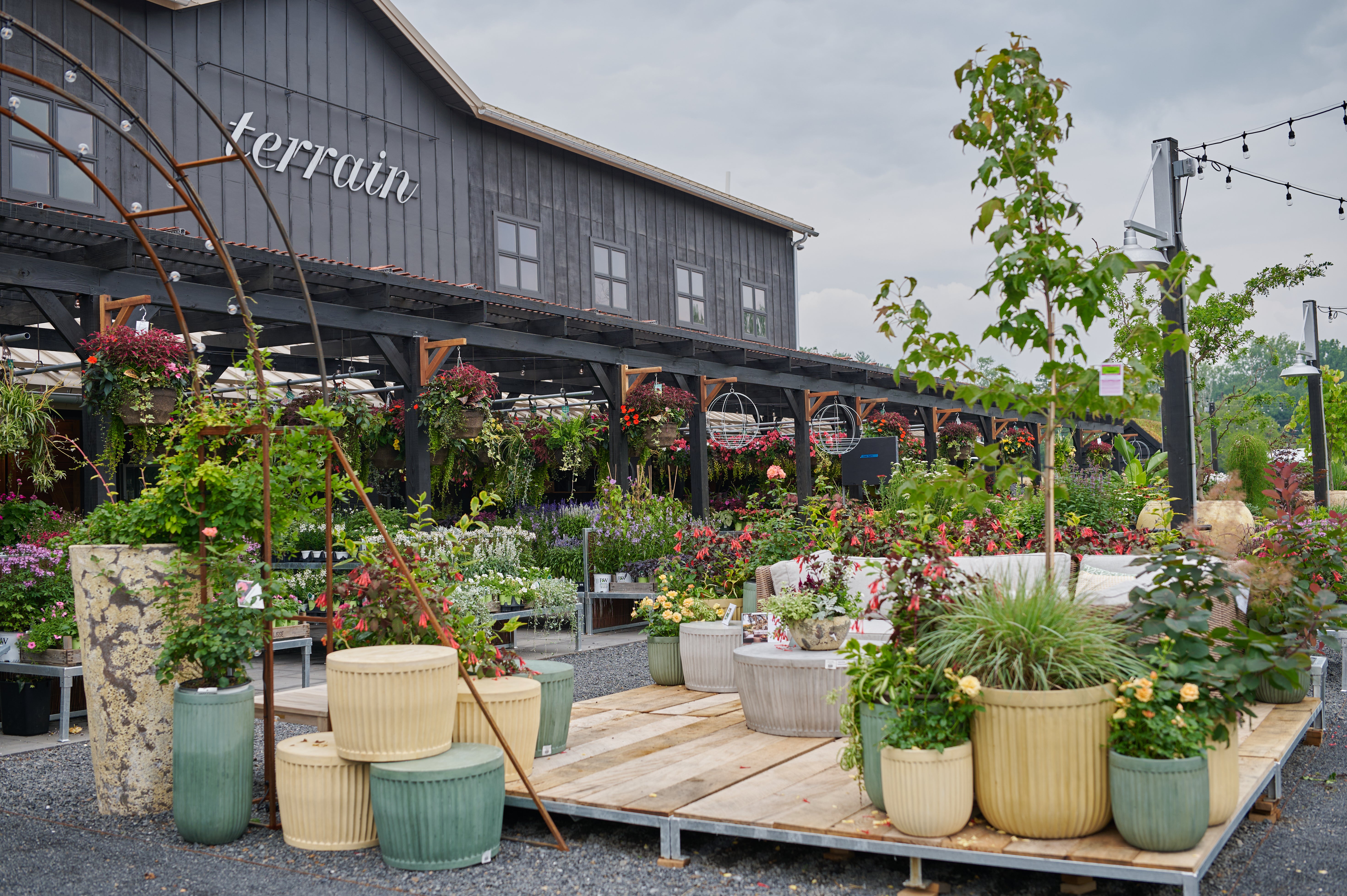In the rolling hills an hour north of Philadelphia sits Delaware Valley University, a small agricultural college spread across more than 500 acres in an otherwise sleepy suburb. Starting this week, the school will house another, perhaps unlikely, addition to its campus—the newest outpost of Anthropologie’s home and garden brand, Terrain. The compound will feature a retail store, nursery, garden cafe and private event space, along with pick-your-own orchards and farm-to-table cuisine. This week, Business of Home got a first look at the location, which was already bustling with preparations to host its first wedding.
The Delaware Valley University (or DelVal, for short) outpost marks Terrain’s fourth stand-alone location, in addition to stores in Glen Mills, Pennsylvania; Devon, Pennsylvania; and Westport, Connecticut. Compared to those sites, however, this new location marks a departure—it’s miles away from the comfort of shopping centers and neighboring retail. According to Terrain’s new president, Aaron Mutscheller, customers already drive hours to visit its existing brick-and-mortar spaces. The brand is betting the DelVal outlet will inspire the same dedication, while helping Terrain fully realize its nature-centric ethos.
“It’s pretty commanding,” says Mutscheller. “You come up to the property, and it’s this island of beauty—and the surrounding areas are just as compelling as the physical structures themselves.”
In a way, the location is a return to form for the brand. Back in 2008, Dick Hayne—founder of Urbn, the parent company of Anthropologie and Terrain—had an idea for a store that merged garden and home, elevating the niche that many small-business nurseries once held before getting sidelined by the introduction of nurseries at big-box retailers. He chose a historic horticultural site for the first Terrain location: the J. Franklin Styer Nurseries in Glen Mills, founded in 1890 (its claim to fame includes having a decadeslong standing order for peonies at The White House).
Over the years, the company layered hospitality on top of its central nursery and home decor offerings. The new location takes that approach and supersizes it—with farm-to-table food, greenery grown on campus and decor offerings to complement the entire assortment. The art of it, says Mutscheller, is intertwining them all so they feel like parts of a whole.
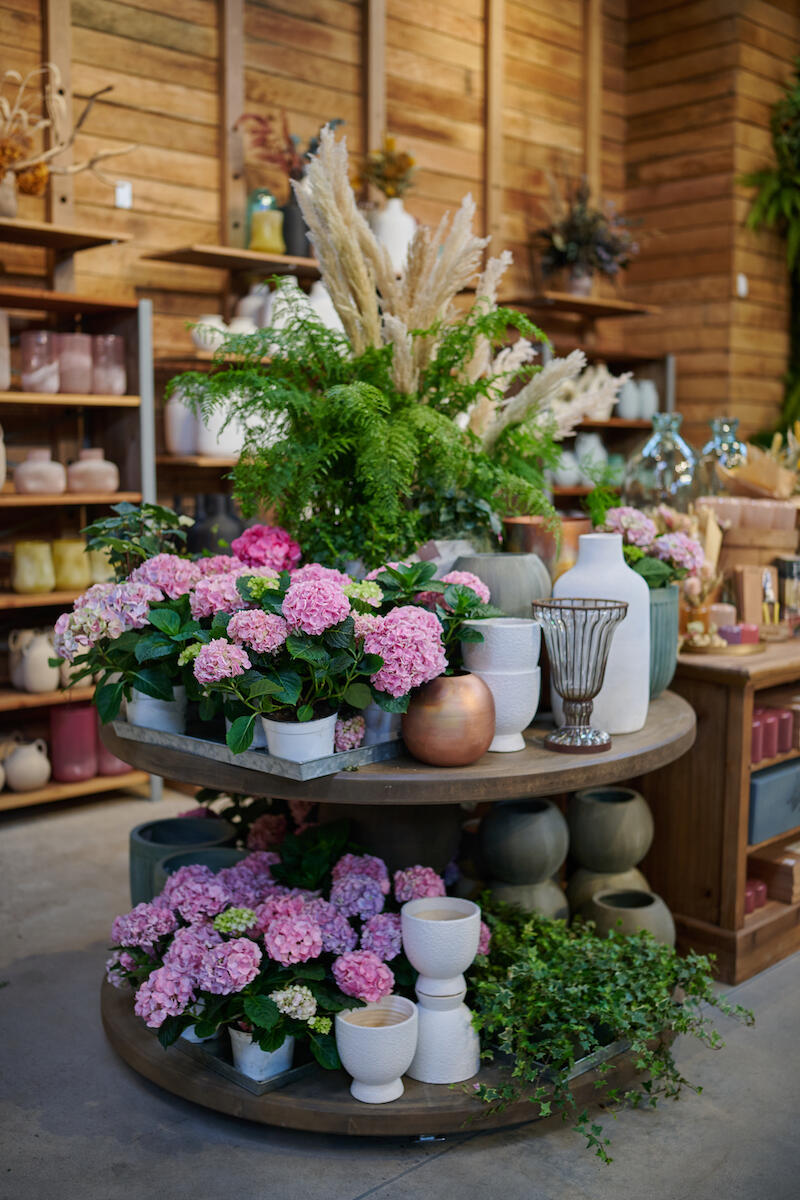
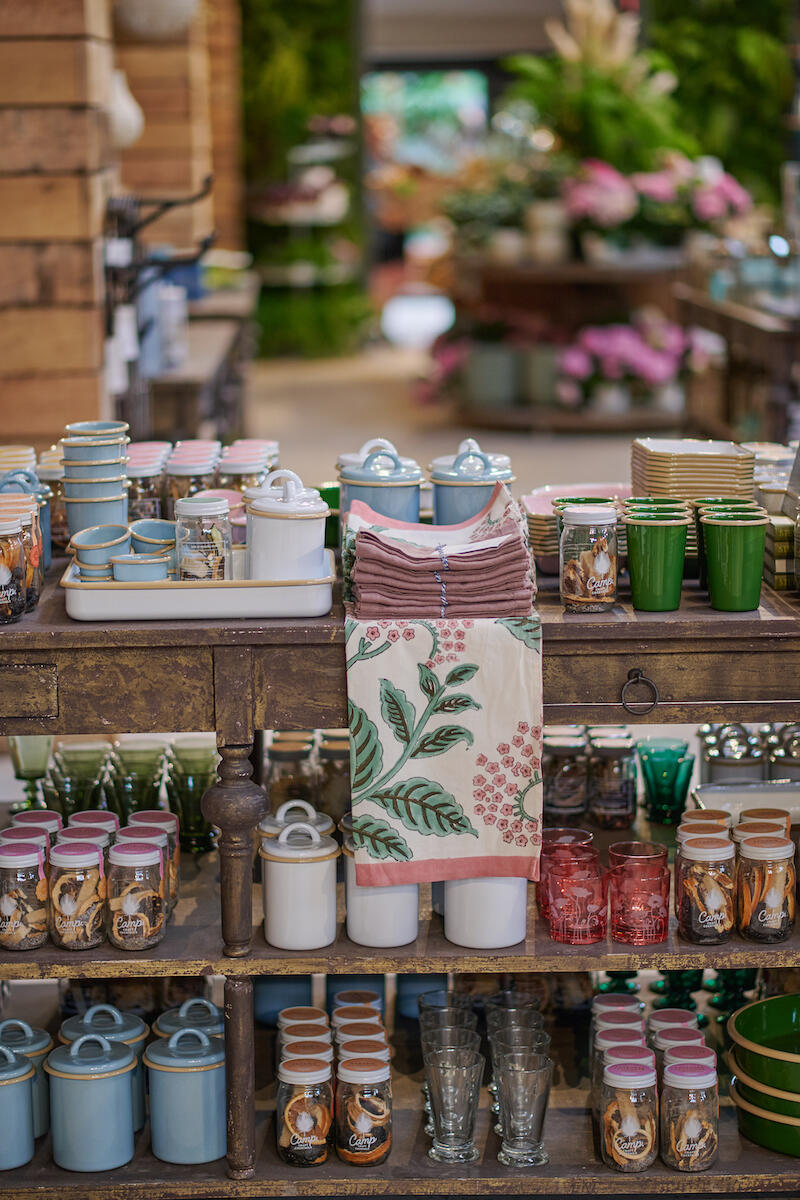
At certain points throughout the nursery, visitors can wander into styled vignettes created with shoppable outdoor furniture from Terrain’s own decor line. “Inspiration comes from around the world, especially across Europe, by the gardens and nurseries there, [and] by the way Europeans embrace spending time outdoors year-round,” says Greg Lehmkuhl, Terrain’s creative director. Inside the retail shop, customers are greeted by elaborate installations (a petrified tree adorned with hundreds of silk peach blossoms, for example) and a vast array of nature-focused product. A mix of the company’s brands and market buys from small businesses and artisans, the assortment spans gardening tools and accessories, botanical bath products, gifts, lighting, and interior and outdoor decor. The space’s greenhouse acts as a link between indoor and outdoor spaces—there, customizable offerings include a build-your-own terrarium station, with soil, rocks and succulents close at hand.
Even the cafe nods to the retail store’s offerings. One starter features warm bread baked in a terra cotta flowerpot (the brand sells a make-your-own kit), while dessert is a terrarium-inspired mousse, served in a glass semi-globe. The restaurant also serves microgreens cultivated in the university’s Freight Farm—a hydroponic vertical farming system housed in a shipping container, designed to make produce more accessible and sustainable.
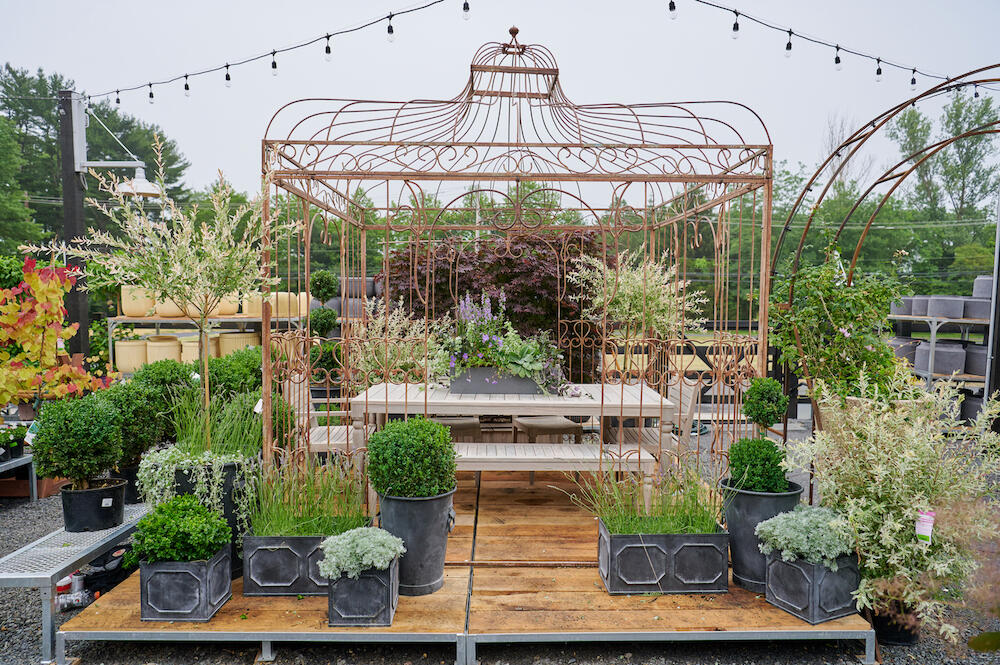
The dining room looks out on to the nursery, where fresh produce, meat, eggs and honey cultivated at DelVal will be sold seasonally at pop-up farm stands and incorporated into the cafe’s menu. Beyond that, the site’s orchards will allow visitors to pick their own produce, starting with peaches and apples in the summer and pumpkins in the fall. Plus, in this and other agricultural-related endeavors, the brand will tap into the university’s expertise with a new internship program.
Altogether, the combined spaces and features create a unique atmosphere. With the newfound acreage, Terrain can also lean further into the events side of the business. “The capacity now that we have at DVU is a good amount for larger scale events or weddings,” says Tricia Smith, Anthropologie’s global CEO. “It’s been built from the appetite and us being able to keep up with the demand. … it’s become a bigger, more important part of the strategy.” Before even opening to the public, the new location’s event space is booked through the rest of the year, evidence of the retailer’s die-hard fan base in the region.
Further afield, however, Terrain has found brand recognition trickier. The pandemic helped a lot—consumers were shopping online more, and more importantly, they were shopping for outdoor and garden items in record numbers (“a lot of plant parents were born out of the pandemic,” says Smith). That drove interest in the brand in general and helped fuel its current phase of growth. Still, the company is hoping to strengthen its presence among a wider group of consumers and trade professionals.
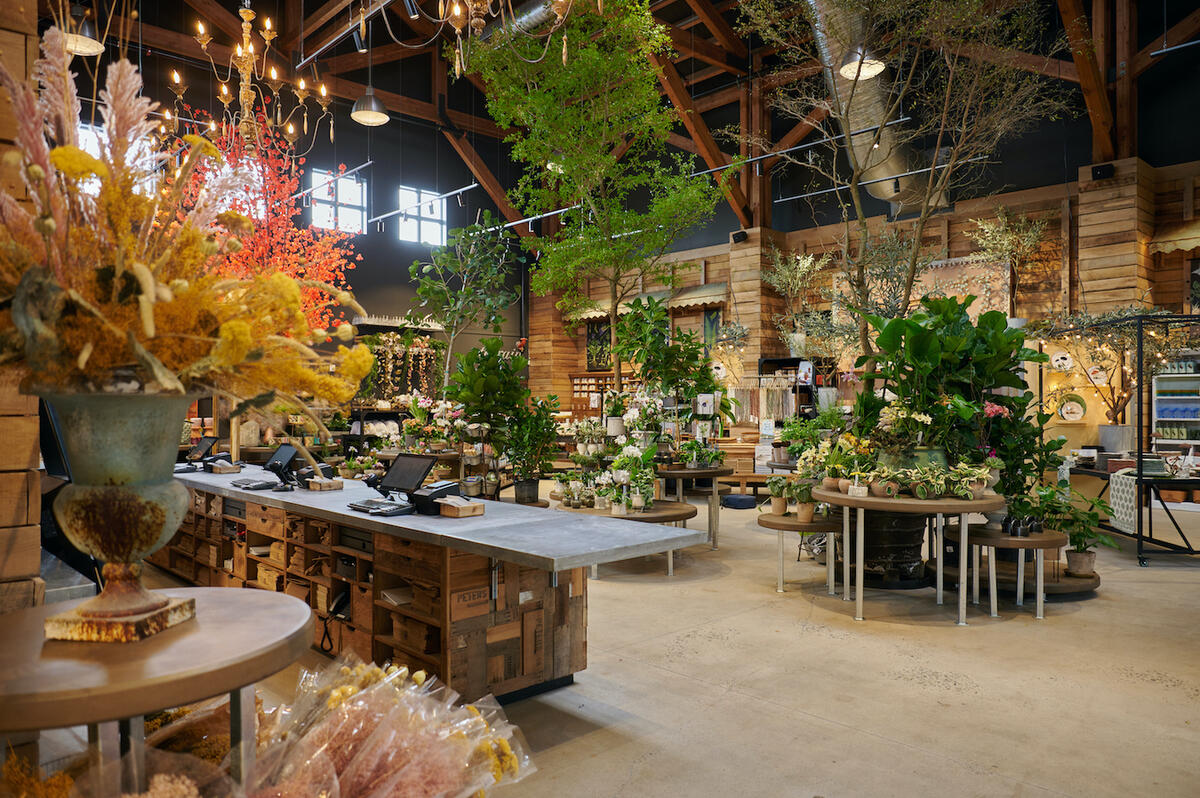
“I find myself in conversations with AD100 designers who don’t know about Terrain. It’s one thing to experience it digitally—it’s another thing to experience it locally,” says Mutscheller. “We’ve got a lot of introductions to make here within the community of gardeners, but I also think there’s a vast group of professionals who I can’t wait to get in front of.”
Looking ahead, the company has a two-pronged approach for making that happen, starting with translating some of the atmosphere’s in-person magic into digital elements (through social channels, user-generated content and newsletters) and, in the years to come, opening additional Terrains across the country—something the company is already exploring with truncated locations tacked on to Anthropologie stores in places like Bethesda, Maryland, and Palo Alto, California.
“We’ve got the right recipe with the combination of food, event, retail and nursery,” says Smith. “Now we are looking for future opportunities to capture the opportunity, to harness the magic of that brand and think about how we can introduce it to more customers.”
Homepage image: The new Terrain location debuted on the campus of Delaware Valley University | Courtesy of Terrain
















